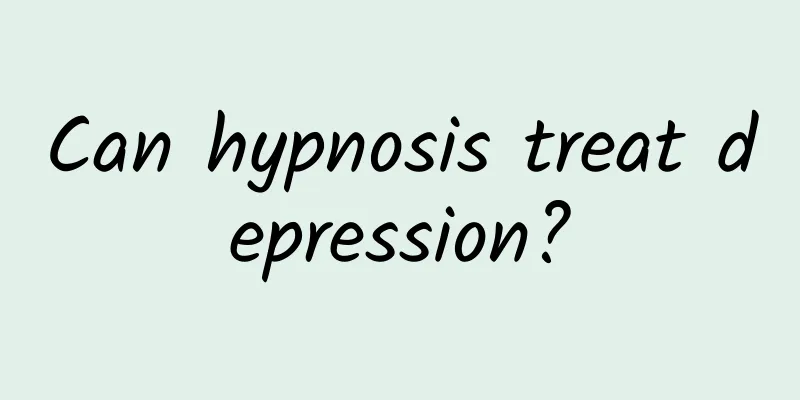What are the symptoms of hysterical seizures?

|
Hysteria is a type of mental illness with complex symptoms. It often causes convulsions, cramps in the hands and feet, paralysis, aphasia, and deafness. Therefore, hysterical convulsions are a very scary symptom. Because everyone has different hysterical symptoms, it is difficult to treat. However, we cannot give up treatment once the disease has occurred. We just need to thoroughly understand the various symptoms of hysteria. So what is a hysterical spasm like? Common manifestations of hysterical spasms: 1. Hysterical convulsion attack: under emotional excitement or suggestion, the attack occurs suddenly, and the patient slowly falls down and lies on the bed or the ground. The limbs twitch irregularly or become stiff and arched in opisthotonos, or the patient grabs the hair with both hands, beats the chest, or toss and turn. It is often accompanied by mental symptoms such as groaning, crying, talking to oneself, and yelling. The scope of consciousness is narrowed and in a hazy state. The pupils have normal light reflex, and there is no enuresis or trauma. The attack may last for dozens of minutes or stop and breathe for several hours. Only then will the muscles of the whole body relax, and the patient will fall into a coma or gradually wake up. There may be general memories. 2 Aphasia caused by hysterical spasm: The patient remains silent and does not make any sound, but is fully able to maintain the ability to communicate in writing. When communicating with others, he or she uses text or gestures instead of words. The intelligence is intact, and the vocal cord activity is normal during examination. It is called "hysterical silence". 3. Paralysis attacks caused by hysterical convulsions: mostly paraplegia, hemiplegia, and monoplegia can also be seen. Its characteristics are: the muscle tone of the paralyzed limbs is sometimes high and sometimes low, the passive limbs often resist, the paralyzed limbs can move when attention is diverted, and the degree of paralysis can be mild or severe. In mild cases, the limbs are just weak, while in severe cases, the limbs cannot move at all. Patients with a long course of illness may have disuse muscular atrophy, but examination shows no organic nerve damage, no pathological reflexes, and normal electromyographic responses. This type of symptom is called "hysterical paralysis". Some patients can move in bed without obvious paralysis, but cannot stand or walk, which is called "hysterical astas" or "hysterical agastas". 4. Hysterical blindness or amblyopia: sudden blindness or amblyopia. On examination, the patient had a good light reflex, normal fundus, and no evidence of other eye disease. 5. Hysterical deafness: Sudden loss of hearing, absolute deafness on both sides, but no vestibular nerve disorder. The patient does not listen when talking to the patient, nor does he look at the speaker's expression, but can still blink to respond to sounds coming from behind, and can sometimes be awakened in sleep. 6. Hysterical ball: The patient feels a sense of obstruction in the throat and cannot cough or swallow. He feels that there is a spherical object blocking the throat or moving up and down. However, examination of the throat revealed no signs of disease. 7. Hysterical vomiting: Most of the time it is long-term and stubborn vomiting, vomiting occurs right after eating, there is no nausea or vomiting before vomiting, the contents are entirely food, but there is no obvious malnutrition and no gastrointestinal symptoms. 8. Hysterical emotional outburst: often occurs immediately under mental stimulation, manifested by wailing, beating the chest or cursing angrily, tearing clothes and destroying things, rolling on the ground or singing or singing instead of speaking, crying and revealing the cause of the disease, and may curse or hurt others in a targeted manner |
<<: Are hysterical patients self-conscious?
>>: Are hypochondria and hysteria the same?
Recommend
How to classify Henoch-Schönlein purpura?
Henoch-Schonlein purpura is an allergic vasculiti...
I have a lot of pain in the middle of my chest from smoking.
Smoking actually causes many symptoms, such as co...
How to treat sore teeth after confinement
There are many issues that mothers need to pay at...
Spleen and stomach dampness and heat, liver fire
Due to the increasing pressure of work and life, ...
What causes pain in the back of the thigh?
Pain in the back of the thigh is generally pain i...
What is the edible value of blood vine
Sargassum spatholobi is a medicinal material with...
What are the effects and side effects of stir-fried cassia seeds?
Cassia seed is a common Chinese medicine. It has ...
What to eat when you have stomach pain
Many people suffer from stomach pain, especially ...
Chronic nephritis should pay attention to the following four aspects:
Chronic nephritis is a common disease of nephriti...
Symptoms of Qi deficiency
In daily life, when we are doing some intense exe...
High hemoglobin
Hemoglobin is a protein in our body, mainly found...
How long should I stop taking it after a course of treatment?
First of all, everyone needs to pay attention tha...
What are the symptoms of kidney fire?
If you experience pain in the ribs, it may be a m...
What causes toothache during menstruation?
Healthy women will have menstruation every month,...
How to make pork kidneys to nourish the kidneys? Have you eaten too much pork kidneys to nourish the kidneys?
Since ancient times, China has emphasized the pri...









